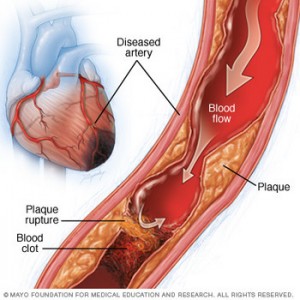When the first attempt of gene therapy were made, a concoction of LDL- receptor genes was infused into the portal vein of patients with a family trait of high cholesterol levels. This was back in 1989, and the results at that point were not encouraging.
In the meantime advances have been made in genetic research. Dr. Duncan Stewart of the cardiology department of St. Michael’s Hospital in Toronto who is considered by many as the guru of cardiac gene therapy, reports that we are now “at a crucial stage of the field”. He cautions, that having the gene on hand is only part of the answer. For good results it is also important to understand how the delivery system to the diseased organ works.
Gene therapy stands out from other treatment options, because instead of drugs, DNA is provided. DNA itself is not the therapeutic agent. It penetrates the cells where it sets up shop and produces proteins, which are needed for therapy. In the case of heart disease, where heart vessels are blocked or have been damaged, the idea is to send specific DNA sequences to the heart cells and stimulate the production of growth factors. These growth factors would trigger new heart vessels to grow and take over for damaged or blocked vessels. This is not just a dream of a research team: a gene therapy trial – the only one of its kind in Canada – is on its way under the leadership of Dr. Stewart. This ambitious project was launched in 2002. In seven sites across Canada 110 patients with heart disease are receiving the vascular endothelial growth factor gene (VEGF for short). The gene is being directly injected into the areas of the heart where blood vessels have become diseased or blocked. The placement is measured with a mapping system known as NOGA. At the end of the year the study enrolment will be finished. Patients will be followed up for results 6 months later. This therapy promises long lasting effects, but it still has a long way to go.
Dr. Robert Hegele from the Blackburn Cardiovascular Genetic Laboratory at the University of Western Ontario is credited with uncovering eight genes for human disease (four of them are related to cardiovascular illness) and 80 mutations in other genes that are contributing to premature heart disease and diabetes. Dr. Hegel’s interest is to discover the villains that predispose people to illness, but at the same time he cautions that genes are not everything. Being genetically susceptible does not necessarily foretell one’s destiny when it comes to developing heart disease. Dr. Hegele emphasizes that the longer he works in the genetic field, the more he respects environment and lifestyle and finds that most people can even overturn genetic susceptibility and he leaves us with the final remark: “Tell your patients to stay away from tobacco, eat wisely and get that needed exercise.”
More info on arteriosclerosis (hardening of the arteries): http://nethealthbook.com/cardiovascular-disease/heart-disease/atherosclerosis-the-missing-link-between-strokes-and-heart-attacks/
Reference: The Medical Post June 29, 2004 (Vol. 40, No.26): page 35
Comment (July 9, 2012): Note that this trial failed to show effectiveness as indicated in the paper below. So, eat wisely, exercise and don’t smoke.
VEGF gene therapy fails to improve perfusion of ischemic myocardium in patients with advanced coronary disease: results of the NORTHERN trial. Stewart DJ, Kutryk MJ, Fitchett D, Freeman M, Camack N, Su Y, Della Siega A, Bilodeau L, Burton JR, Proulx G, Radhakrishnan S; NORTHERN Trial Investigators. Mol Ther. 2009 Jun;17(6):1109-15. Epub 2009 Apr 7.
Last edited Oct. 26, 2014






